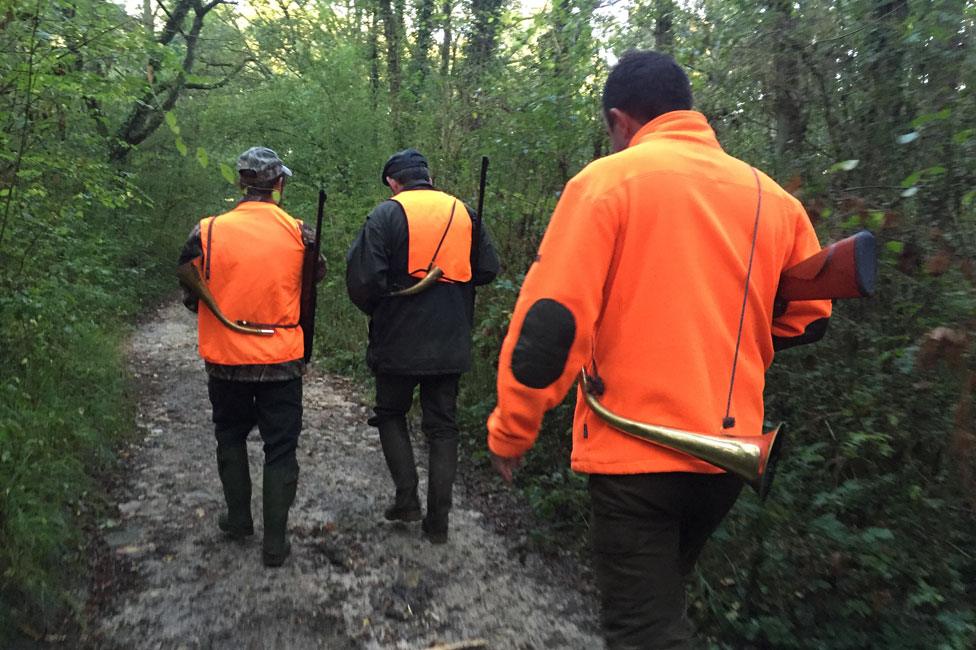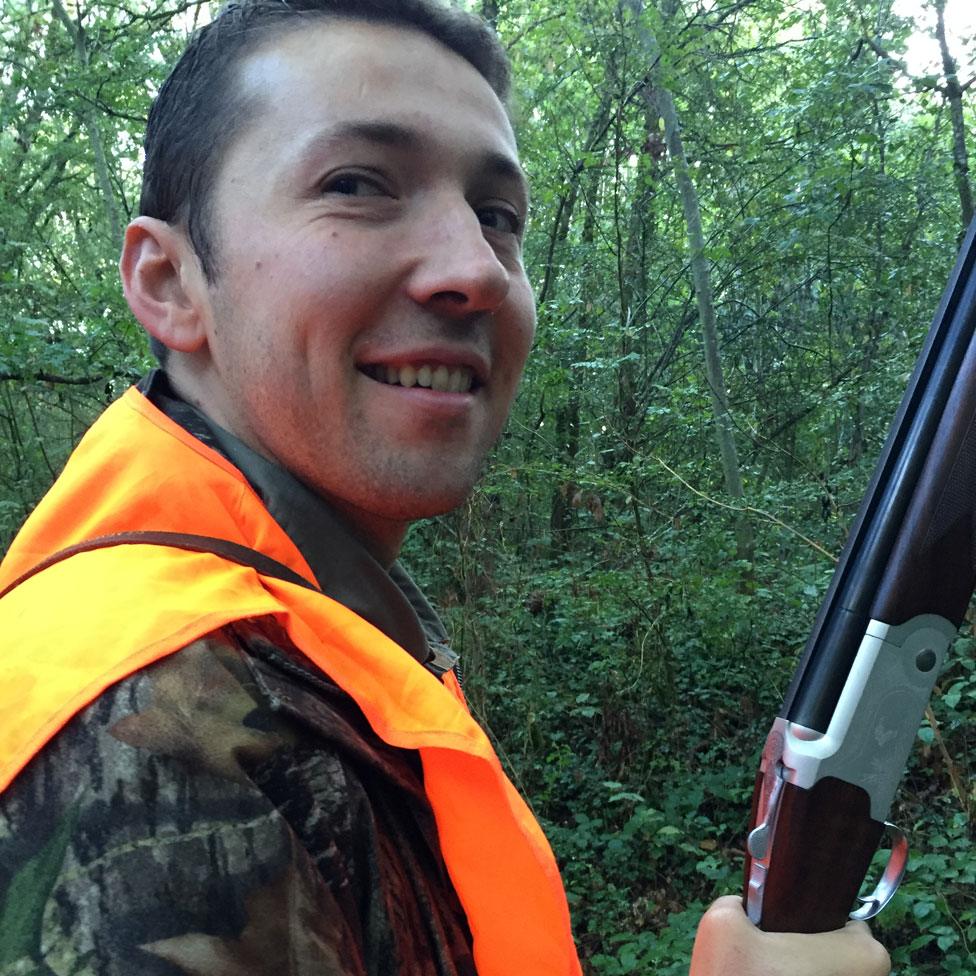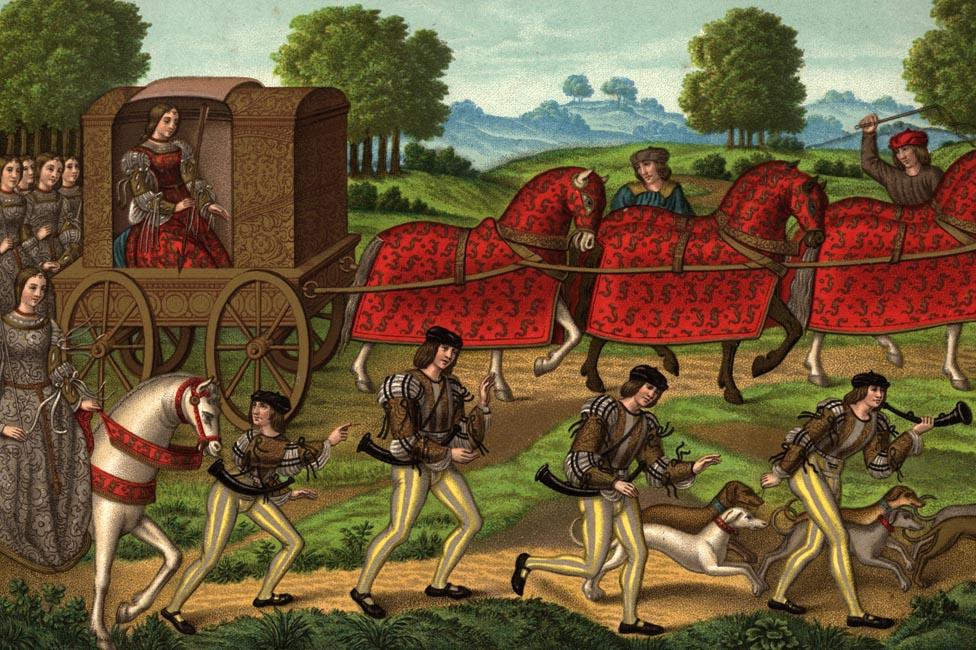How France is falling out of love with hunting
- Published

The French are renowned as enthusiastic hunters. The country even has a political party called Hunting, Fishing, Nature, Tradition. But, as John Laurenson reports, each new generation has a greater aversion to harming animals.
In a wood near the village of Hanches, 50 miles west of Paris, it's so quiet you can hear the rain dripping off the trees.
"I like to hear all the noise in the forest. I think I am like an animal, like a prehistoric man. It's in my nature," whispers Mathieu Andro, a 38-year-old agronomy researcher with a rifle.
Strung along this forest path are seven other hunters. And soon we start to hear the strange yelps of six more who, with a couple of dogs, are beating their way towards the line.
There's a scuffling in the bushes and a deer darts out of the wood, stands there for a moment and bounds on.
Andro swears, fumbles for his hunting horn, gives the two-blast signal for a roe and swears again.
Even if he'd had time to get a shot in, the angle was too risky, he explains. If he'd taken a shot, he might have hit the next hunter in the line. But still it's annoying.
He had already missed a stag the previous week. It was a pretty amazing experience though, he says, tracking it for three hours. "I was so close I could smell him."
Mathieu Andro is one of the approximately one million hunters (1,246,000 according to the French Hunting Federation, 960,000 according to anti-hunting pressure groups) that make France the biggest hunting country in Europe.
But every year for as long as anyone can remember the number gets smaller. Thirty years ago there were roughly twice as many.
This is partly due to the decline of animals to hunt.
"I've been hunting since I was 16. I'm 64 now. I can remember when there were 120 of us. Now we're 28," says Bernard Poirier, president of the Hanches hunters' association.
"It's because of intensive farming," he says. "They've killed most of the small game (hare, partridge, pheasant, woodcock) grubbing up hedgerows and creating the massive fields we have now. The hare eat the pellets the farmers put down for the slugs and die and the partridges are mangled in their machines."
France's deer and wild boar populations, on the other hand, are on the rise. There are so many of the latter - rooting around in crops, ramming Renault Scenics - that hunters are allowed to shoot pretty much as many as they like.
Sometimes, the authorities even step in to shoot a few more.

Andro Mathieu: Many country people are now too squeamish to kill a chicken
At about 10am, after succeeding in shooting precisely nothing, the Hanches hunt takes a break. There are no labels on the jars of pâtés or the bottles of wine they open up. Everything's made by the hunters themselves or their friends.
I get talking to a mechanic, a school canteen cook, a bus driver and a chip stand-owner and hear about another reason for the decline of the French hunter - the cost.
There's the price of the gun, the bullets and cartridges and the clothes that make you look like you've walked in from a war zone, the licence and the fee for every animal you kill (up to 300 euros for a stag).
The National Federation of Hunters gives me a further reason for the disruption of hunting - people moving from the country to the towns and, more generally, from place to place.
Bernard Poirier, meanwhile, says young people can't be bothered to get up early and tramp around the wet fields but prefer to fiddle around with their mobile phones.
Whatever the cause, an old French tradition is under threat.

La chasse des dames (the ladies hunt), circa 1550
French schoolchildren, taking a first stab at grown-up reading, often have a go at My Father's Glory by one of France's best-loved novelists, Marcel Pagnol. The "glory" in question is a brace of rock partridges.
Guy de Maupassant wrote enthusiastically about hunting too. So did Albert Camus.
All would have been keenly aware that the common people's right to hunt was the first won from the nobility by the French Revolution.

Find out more
Listen to John Laurenson's report for the World Tonight on the BBC iPlayer

But now it's the opponents of hunting who are on the rise.
In front of the Senate, the upper house of the French parliament, where a few dozen protesters are chanting "No hunting, no hunting!" I meet François Darlot, president of France Without Hunting, a pressure group that hopes that France will follow the lead of the canton of Geneva, in Switzerland, which banned hunting back in 1974.
"Things have changed a lot since my father's day," Darlot says.
"He was a farmer and a hunter at a time - about 50 years ago - when France had two-and-half million hunters.
"The main reason for the decline is that our values have changed. We have so much more sensibility now when it comes to the animal world."
On my next outing with the Hanches hunters, a small group this time, we walk over a field of wet rapeseed looking for small game.
One of the younger hunters, Christophe Potier, is the first Frenchman I've seen in a good long while who wears a beret.
His dog puts up a partridge. He aims, fires and brings it down. It struggles on the ground for a moment before his dog finishes it off and brings it to its master. A beautiful bird. Still warm.
One of the things Christophe's hunting friend Mathieu had told me in that wood the previous day was that, a generation or two ago, French country dwellers were able to kill a chicken without thinking twice about it. Not any more - many now are too squeamish.
But Christophe is more old-school. And he's got plans for his partridge.
"I'm going to pluck it and cook it," he says. "Roast it probably. With mushrooms."
Join the conversation - find us on Facebook, external, Instagram, external, Snapchat , externaland Twitter, external.